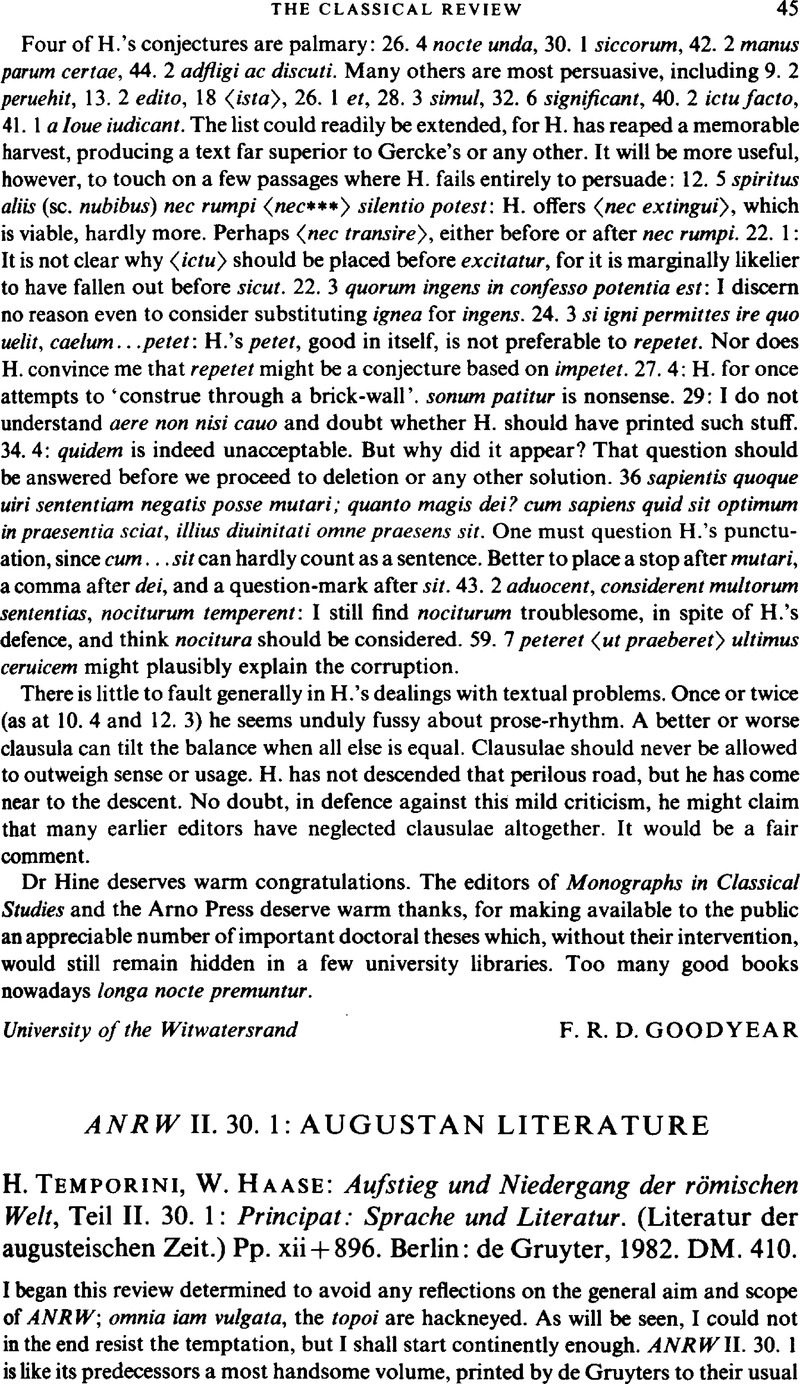No CrossRef data available.
Article contents
Anrw II. 30. 1: Augustan Literature - H. Temporini, W. Haase: Aufstieg und Niedergang der römischen Welt, Teil II. 30. 1: Principal: Sprache und Literatur. (Literatur der augusteischen Zeit.) Pp. xii+896. Berlin: de Gruyter, 1982. DM. 410.
Published online by Cambridge University Press: 16 February 2009
Abstract

- Type
- Reviews
- Information
- Copyright
- Copyright © The Classical Association 1984
References
1 I make this chauvinist point because it is a frequent, and frequently justified, accusation against English authors that they ignore scholarship in French and Italian.
2 A familiar enough phenomenon in bilingual texts; there is a good modern example in Timpanaro, S., The Freudian Slip, English ed. (London, 1976), 128.Google Scholar
3 cf. A. J. Woodman's review, G & R 27 (1980), 189–90.
4 The Aeneid on 99 is described as ‘that crowning achievement of Roman poetry … which is not only a poetic masterpiece, but an elaborate symbol, coded into the language of poetry, of the poet's understanding of the human condition’.
5 e.g: ‘After Nero, both writers and critics lose their prestige’ (96); ‘there were no Roman prose texts that could be regarded as literature before Cicero’(105); the original function of epic is ‘as a kind of promenade concert (where you could come in late or leave early because the story was a familiar one and you could easily tune in to what was going on)’ (144); ‘Tacitus is a reactionary who does not see that one's understanding of the past is something as widely communicable as one's understanding of philosophical concepts once the expression of that understanding is cast in prose’ (166 - if I understand it).
6 Compare the definitions of ltterae on pp. 138 and 141.
7 90: ‘the Romans even as late as the first century AD still felt that performance was the real thing, and a written text only really appropriate where the work was of a highly technical nature’ 142:‘in the Augustan Age, the poet thinks of himself as a writer rather than a performer’; 144: ‘in the Augustan Age it seems clear that the written text continued to be felt as no more than the basis for a performance’.
8 Q. tackles the vexed question of the collegium poetarum and passages like Hor. Serm. 1.10. 33–9, Ep. 2. 2. 94; he is less sceptical than Horsfall, but not absurdly gullible.
9 ‘Pete nobiles amicos: Poets and Patrons in late-Republican Rome’ in Literary and Artistic Patronage in Ancient Rome ed. Gold, B. (Austin, 1981) 28–49, at 38. His short piece inLatin Teaching 26.2 (1982), 33–7 on the other hand is judicious and informative.Google Scholar
10 cf. Goody, J., The Domestication of the Savage Mind(Cambridge, 1977), 157 on George Herbert.Google ScholarPubMed
11 cf. Rawson, E., ‘The Introduction of Logical Organisation in Roman Prose Literature’, PBSR 46 (1978), 12–34.Google Scholar
12 Not always correct: Prop. 1. 7. 11 ‘me laudent doctae solum placuisse puellae’ does not mean ‘Von mir sollen die gebildeten Mädchen sagen, dass ich allein ihnen gefiel’, despite H.'s attempted defence 228–9. He had been anticipated by Ronconi; see Fedeli, ad loc.
13 See p. 247.
14 Like many such analysts, H. confuses the extremely common closure technique of recalling the beginning at the end with the much rarer one of full ring-composition.
15 Gnomon 53 (1981), 231–5. Cf. also e.g. Fedeli on Prop. 1. p. 16.
16 G B 8 (1979), 185–204.
17 In this respect W. Fauth's ‘Römische Religion im Spiegel der “Fasti” des Ovid’ in an earlier volume (II. 6. 1) of ANRW is particularly disappointing.
18 Apart from a paragraph inserted with complete irrelevance as a footnote to the Tibullus section 490 n. 324.
19 II. 13. 278–339; add now to the extra bibliography listed there at 339 Galinsky, K., ‘Augustus’ Legislation on Morals and Marriage’, Philologus 125 (1981), 126–144.CrossRefGoogle Scholar
20 e.g. 552. He is coy incidentally on the date he is assuming for the first edition of the Amores, a point of some importance; cf. 551 however.
21 As I say above Cairn's attempt to make 2.7 into a laus legis does not persuade me.
22 cf. R. Syme, History in Ovid (Oxford, 1978), 202 on the ‘flora and fauna‘of ’the borderlands of society in a post-war world’.
23 Social Origins of Dictatorship and Democracy (Boston, 1966).




